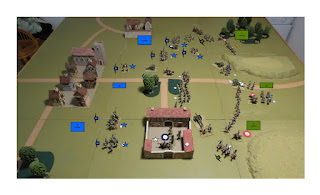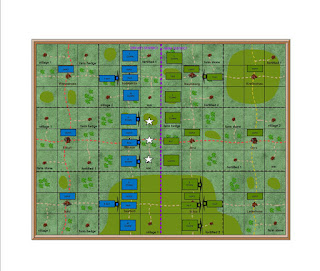7 May 1813 –
Central Germany – Day 7
Both armies are nearing the end of their operational ability
Despite heavy fighting over the past 4 days, neither side has gained an advantage.
It is becoming clear that the French will not be able to achieve their campaign objective of taking Gera
In the north French retreat to Sommerda, Russians regroup at Naumburg
In the centre Russians rally at Jena, French resupply at Weimar
In the south French attack Sulza
Battle of Sulza
To secure the border Marshal Davout orders 6th French army to take Sulza.
A victory would at least secure a foothold in the District of Gera
Both armies start the battle with considerable battle casualties
MacDonald is aware that with such brittle morale he cannot risk heavy casualties
As attacker, this presents a difficult problem.
A depleted 8th French corps will hold the mountainous northern section
He creates a reserve of three infantry and one cavalry brigades
This will form the spearhead of his attack.
15th Vistula corps will support the attack in the south.
He deploys his army out of artillery range of 3rd Russian army
His corps artillery advance into range of the Russian infantry and open fire
The Russian guns reply, but do little damage
The French reserve advance in the centre
The Vistula lancers move forward to threaten the enemy artillery
Russian Cossacks charge the lancers, but lose the melee and rout
A nearby Russian infantry brigade lose their resulting morale test and join the rout
The Russian gunners abandon their guns and take cover in the remaining infantry square
By midday it is clear to Winzingerode that he cannot hope to hold the French
With two infantry and one cavalry brigade in rout he orders the rest of his army to withdraw
One infantry brigade will hold Sulza until nightfall, and will then retreat to join the rest of the army
The Russians have lost 3 infantry and 1 cavalry casualties (1300 men)
The French have suffered no casualties
Comment
The outcome of this battle was decided solely on morale
Almost every brigade in both armies had at least 10% casualties from earlier battles
This left them very vulnerable if forced to take a morale test
It also made it very likely that if one brigade were to rout, the supporting brigades might well join them
So the French commander held his infantry and cavalry out of artillery range of the Russian army
He then advanced his artillery to long range of the Russian infantry, who had to hold their ground to protect their guns
His intention was to weaken the infantry with artillery fire, and then attack with infantry and cavalry.
The only reply open to the Russian gunners was to fire on the difficult to hit French gunners
Only one Russian infantry brigade was hit, and it lost its morale and routed
Fortunately their supporting brigades passed their morale test.
The French infantry would now have to advance to take Sulza
This meant moving into range of the Russian gunners
Only the French reserve advanced, the two corps on the flanks held their ground
The Russian infantry brigade which had routed left one of the Russian batteries uncovered.
The Vistula lancers advanced to threaten these guns, and the supporting Cossack brigade counter charged
The Poles won the melee, and routed the Cossacks
A nearby Russian infantry brigade had to test their morale, failed and joined the Cossacks
The Russian gunners had to abandon their guns and seek shelter in a nearby infantry square.
As the result of one cavalry melee the Russian centre was broken, without a single French casualty
The remainder of the Russian army was now seriously outnumbered and withdrew before the French could reach them
However this battle could just as easily have gone the other way
If the Russians infantry square had not broken things would have gone very different
The Vistula lancers could not have charged the Russian infantry
They would have come under artillery fire to get within charge range of the Cossacks
Possibly lost casualties, cavalry melee should have resulted in a draw at best
French infantry would have had to march towards the guns
Would almost certainly have lost at least one infantry brigade
May well have lost more due to failure of morale.
Should have been a Russian victory
Turned out to be a French one







